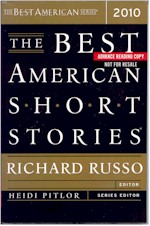 |
|
|
| ||||||
|
|
This page is the original source of this review, though you may also find it on Amazon or other sites. | ||
| Book Reviews Home | Free Audio Books | |
 |
Book Review of:
|
| Review
of
The Best American Short Stories of 2010, by Richard Russo and Heidi
Pitlor (Softcover, 2010) (You can print this review in landscape mode, if you want a hardcopy) Reviewer: Mark Lamendola, author of over 6,000 articles. This is a compendium of 20 short stories that probably are representative of last year's crop of new short stories. I think the editors did an amazing job of sorting through the "contestants" to come up with 20. It could not have been easy. I wonder about that 21st short story.... I would love to be able to say which short story in this collection was my favorite. But, I can't even narrow it down to the top three. I could say which ones I liked the least, but that would not be due to the quality of the story. So, I'll leave out that kind of opinion from this review. The introduction, which I expected to be banal boilerplate, was an excellent piece in its own right. Russo addressed the rapidly accelerating decline in published short stories, and the numbers are chilling for anyone concerned about the literary arts. It's worth noting, and Russo did, that the best authors of novels typically hone their craft in the short story. We may soon find this training ground no longer exists, so what are the implications for novels in the future? Russo's introduction also holds some useful thoughts for authors. For example, he tells of the interesting way that Isaac Bashevis Singer made the point to a writing class that the purpose of literature is to entertain and to instruct. The story about this drove the point home to me.
This book is, of course, entertaining. If you're an attentive reader with an interest in writing, it's also instructive. I think it's a worthy addition to anyone's book collection. Something that's great about the short story is it makes a nice "event" or "program" for a social gathering. That's worth considering over the upcoming holidays, if you have never tried it before. With the short stories in this particular book, it won't be hard to select a winner that will delight your audience. This book consists of 20 stories in 387 pages. The stories are of varying lengths, but no single story takes long to read. The collection of short stories is followed by 14.5 pages of contributors notes. That, in turn, is followed by two other sections:
If you like short stories (and the book authors they spawn), consider supporting one of the magazines that publishes them. Most subscriptions are inexpensive. | |
About these reviewsYou may be wondering why the reviews here are any different from the hundreds of "reviews" posted online. Notice the quotation marks? I've been reviewing books for sites like Amazon for many years now, and it dismays me that Amazon found it necessary to post a minimum word count for reviews. It further dismays me that it's only 20 words. If that's all you have to say about a book, why bother? And why waste everyone else's time with such drivel? As a reader of such reviews, I feel like I am being told that I do not matter. The flippancy of people who write these terse "reviews" is insulting to the authors also, I would suspect. This sound bite blathering taking the place of any actual communication is increasingly a problem in our mindless, blog-posting Webosphere. Sadly, Google rewards such pointlessness as "content" so we just get more if this inanity. My reviews, contrary to current (non) standards, actually tell you about the book. I always got an "A" on a book review I did as a kid (that's how I remember it anyhow, and it's my story so I'm sticking to it). A book review contains certain elements and has a logical structure. It informs the reader about the book. A book review may also tell the reader whether the reviewer liked it, but revealing a reviewer's personal taste is not necessary for an informative book review. About your reviewer
About reading styleNo, I do not "speed read" through these. That said, I do read at a fast rate. But, in contrast to speed reading, I read everything when I read a book for review. Speed reading is a specialized type of reading that requires skipping text as you go. Using this technique, I've been able to consistently "max out" a speed reading machine at 2080 words per minute with 80% comprehension. This method is great if you are out to show how fast you can read. But I didn't use it in graduate school and I don't use it now. I think it takes the joy out of reading, and that pleasure is a big part of why I read. |
| |||||